An OAG360® Exclusive: Interview with John Hickenlooper, Governor of Colorado
Colorado enjoys robust energy development as an integral piece of its economy. It’s the seventh most productive oil state, sixth in natural gas production and it’s eleventh in the U.S. for coal production.
According to the Business Research Division of the Leeds School of Business at the University of Colorado, the upstream and midstream oil and gas industry recorded almost 32,000 jobs in 2012, supported an additional 61,000 jobs, paid direct wages to oil and gas industry workers in excess of $3.2 billion and supported an additional $3.5 billion in wages to other industries.
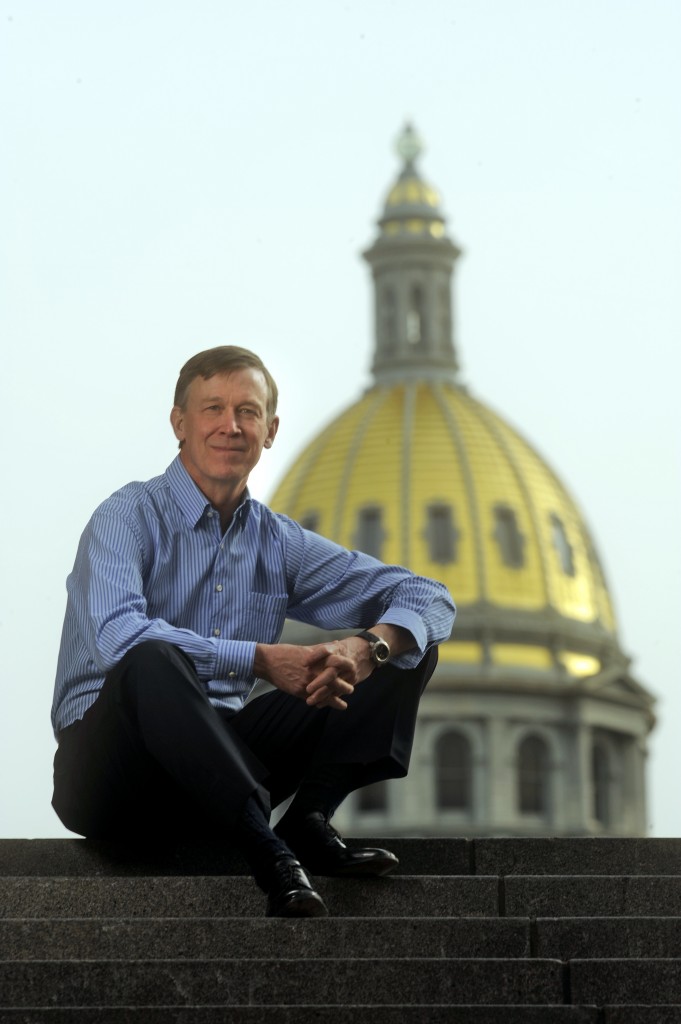
Last year, after a number of local bans on hydraulic fracturing were imposed and two ballot initiatives were circulated for signatures that would have amended the Colorado constitution to enforce larger setbacks on drilling and give local governments regulatory authority over oil and gas operations, Colorado Governor John Hickenlooper called a time out in order to appoint and activate a citizen task force to study the issues surrounding hydraulic fracturing and local government jurisdiction over oil and gas development activities.
Hickenlooper is a 63-year-old Pennsylvania native who has been Colorado’s chief executive since 2011.
Oil & Gas 360® had an opportunity to speak with Governor Hickenlooper about a number of energy issues including the effects of the current oil downturn on the state budget, recommendations from the citizen task force, the effect of new BLM regulations on energy investment, and his stance on the Keystone XL pipeline.
OAG360: Governor, Colorado is one of the nation’s leading oil and gas states, and as you’re well aware, the oil and gas industry is in the middle of a significant downturn with oil prices cut about fifty percent from where they were about a year ago. So at $50 oil, companies are rapidly putting the brakes on drilling operations and capital budgets, and rig counts in Colorado are down by about half.
Drawing on your background as an exploration geologist who lived through the 1980s, given the cyclical nature of the oil and gas industry, what is different about Colorado now and the current oil downturn compared to the oil price dive that put the brakes on development 1986?
COLORADO GOVERNOR JOHN HICKENLOOPER: Well certainly compared to 1986, the overall economy is much more diversified, so I don’t think it will have the same impact on the entire state.
That being said, if you’re a geologist or a petroleum engineer, you know if your company is drilling a lot fewer wells, you know your job is at risk and you’re certainly not going to get much of a bonus. So we, like many people, hope that the prices moderate eventually; I’m not crazy about seeing them go back up to $110, but you know at $75 to $80 a barrel people can make money.
One of the things that’s been interesting to me is how aggressive the service companies, like Halliburton and Schlumberger, how aggressive they’ve been trying to improve the yield from the existing wells. That’s part of the reason you see the rig count is down and yet most of these companies have not laid off as many employees as you might otherwise expect. And I think part of that is that production is holding up due to continuing innovations around hydraulic fracing and horizontal drilling and all these technology innovations that have created this new oil boom.
OAG360: But eventually everybody’s predicting production will start to taper down, due to the fact that we’re not drilling as much. So what impact do you expect the downturn to have on the state budget and jobs outlook, say 2015-2016, as we kind of get through this cycle?
GOV. HICKENLOOPER: Well, again, the timing. It depends how long the price stays this low. Some of the larger operators in Colorado–Anadarko and Noble–they’ve hedged a bunch of their respective sales looking forward, so even when the price is $50, they’re still getting up to $80 a barrel. But again that only lasts you probably into 2016, best case. If the price stays around $50 well into 2016 and into 2017, I expect you will see more layoffs, and that will have a more pronounced effect on the on the overall Colorado economy.
OAG360: How does the State expect it would react to anticipated reduction in revenues from a downturn like this?
GOV. HICKENLOOPER: Well luckily the overall economy is so diversified in Colorado now that it will not be the same kinds of draconian changes that we had to make in the 1980s when really a large chunk of the state’s revenues disappeared in the space of about a year and a half.
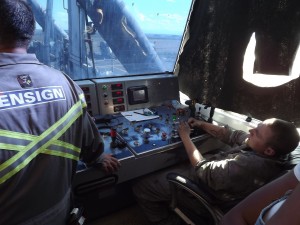 What I worry about is all those employees, if the price stays low–all the employees that have had high paying jobs–$80,000-$100,000 a year–we’ve got to figure out what they’re going to do next, and there aren’t a lot industries where people without a college degree can make $80,000 a year. But I mean it’s what it is. The oil and gas industry has always been boom or bust. We’ve always kind of ridden through these downturns; I’m sure we will ride through this one.
What I worry about is all those employees, if the price stays low–all the employees that have had high paying jobs–$80,000-$100,000 a year–we’ve got to figure out what they’re going to do next, and there aren’t a lot industries where people without a college degree can make $80,000 a year. But I mean it’s what it is. The oil and gas industry has always been boom or bust. We’ve always kind of ridden through these downturns; I’m sure we will ride through this one.
OAG360: What is your view of the recently announced BLM fracing regulations on federal lands? Colorado already has some the strictest rules on oil and gas development in the country. How do you think these new rules from the BLM will impact oil and gas investment in Colorado?
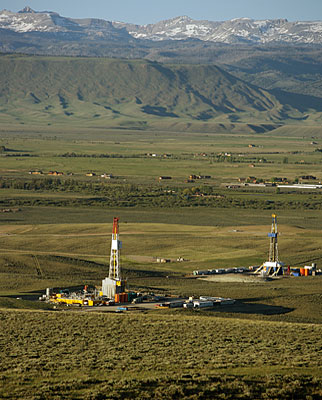
GOV. HICKENLOOPER: Well, almost certainly it will slow down oil and gas investment. It complicates an already complicated procedure in terms of applications and getting permitted to drill on BLM land. You know it’s funny, when you look over the Western states, whether its Republican governors or Democratic governors we’ve all rigorously improved our regulatory environment. I think we’re all pretty similar now, and we’ve been talking just between the governors–Republicans and Democrats–about why we couldn’t have one regional set of regulations in the West.
If we do that, I think that takes a lot of the burden off the BLM. I think if the states can agree, our soles are on the dirt–the soles of our boots are right on the ground. If we can agree among ourselves then I think we have a stronger case to go back to the BLM and say, “You don’t need to regulate methane emissions or fugitive emissions of any kind; you don’t have to regulate all these impact assessments they make; the states are already doing that to a large extent.”
OAG360: I think the industry would be highly in favor of something like that.
GOV. HICKENLOOPER: Well, we’ve talked to the other governors and they’re supportive of it, and I think the industry will support it. It’s going to take six or eight months to have a staff person. There’s an organization called the Western Governors Association which I was the chair of a year ago, and we just need them to hire somebody and find some funding and make sure that they’re able to go out there and really do the work–make sure that the states really are lined up and that Wyoming and Colorado and Utah and New Mexico–that we all do have pretty much the same rigorous regulations.
In some cases it means some states will have to increase their regulations a little bit. I don’t think anyone’s going to lower their regulations, make it less or put more risk to air or water. But most states will only have to come up a little bit and I think the overall benefit of having one system of Western state regulation would greatly outweigh the small regulatory changes between states.
OAG360: Last summer you appointed a statewide oil and gas task force to study and make recommendations as to local municipalities imposing regulations on hydraulic fracturing and whether or not to hand over some rule-making authority to local governments, whereas it’s always been in the jurisdiction of the state. Could you talk about the some of the recommendations that came out of that and take us through what do you think are the next steps?
GOV. HICKENLOOPER: There are about a dozen proposals that came out. We set a very high bar. We had 21 of the top civic leaders i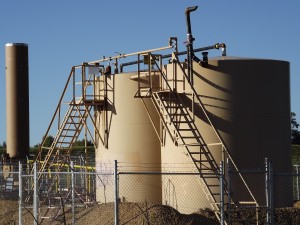 n the state on that task force. We had about a third from the oil and gas industry, about third came from the environmental community, and about a third didn’t have a horse in the race, a dog in the fight.
n the state on that task force. We had about a third from the oil and gas industry, about third came from the environmental community, and about a third didn’t have a horse in the race, a dog in the fight.
They came up with about ten or twelve conclusions that really did begin to give local communities more voice, and when drilling is going to take place in suburban areas where there is a lot of housing density, it begins to lay out some changes like forced unitization–make sure that if there are a bunch of different operators all in a community, by having one operator and putting all the tanks in one place, you really can minimize the impact on that residential community. You can have one point of contact so the community knows who to talk to. One of the recommendations was to take the methane regulations and to make sure that they’re codified.

They allow a number of places–communities, local county commissioners, mayors or city council members–to have a voice and be able to discuss with an oil and gas company and really make sure that they are drilling in the least obtrusive location possible, in terms of the quiet enjoyment that that community wants to have in their homes.
And I think having that dialogue, making sure that there are more avenues for dialogue, making sure that the community and the oil and gas companies that are active in that area–that they really talk to each other, because you can resolve 99% of the problems, the conflicts you see, just by sitting down at the table.
OAG360: Governor, what has the state been doing to strengthen the oil and gas industry and attract further investment to Colorado?
GOV. HICKENLOOPER: I think that we’re blessed to have a broad array of companies that operate in Colorado. We’ve got the large companies like Encana, Noble, Anadarko, WPX, and I would argue that we have some of the most responsible companies. Those companies as well as others–Pioneer, PDC–these are companies that recognize they operate with a social contract–that there’s an understood contract between the operators and the public they’re basically in partnership with, that they’re going to do things as unobtrusively as possible, that they’re going to try and make sure that the drilling is quieter, that there’s not as much dust, that the impact from this activity isn’t going to be any worse than it absolutely has to be on these communities.
The whole question about fugitive emissions and methane escaping, it turns out that there was a lot more than we thought there was, but the oil and gas industry stepped up and it’s going to cost them $60 or $80 million dollars a year. But our air will be materially cleaner, and I think part of that comes from this.
The industry was willing to step up and say, “Alright, as long as you don’t create a bunch of red tape, as long as you make sure every dollar goes to ensuring that the air is cleaner and the water is cleaner, as long as we make sure that we get our fair share of credit because we’re the ones who are helping do this, we’ll go forward with this.” I think that’s what the public has every right to expect and I think [they] really appreciated it.
We ended up with a press conference for the methane regulations where we had executives from the largest oil companies and executives from the largest environmental groups both saying this is a good idea. Well that’s the way things are supposed to work.
OAG360: Last question. You came out in favor of the president’s veto of the Keystone pipeline bill earlier this year; what is it about the Keystone XL pipeline that you oppose?
GOV. HICKENLOOPER: I never opposed it. That was some of the media misquoting [what I said]. What I said was that the president has the right to veto; he has that constitutional authority. And so far, the proponents of the pipeline had not convinced him.
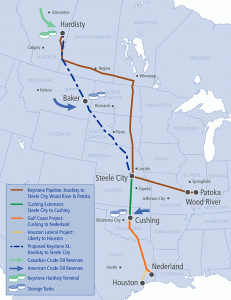
I’m a big believer that pipelines are less expensive and clearly safer. And I have had discussions with legislators and people at the White House, trying to find a way that the Keystone pipeline would make more sense, that they could be persuaded.
One possibility would be that you’d make sure the gravel that’s returned from the oil sands back into the various rivers up there, that it really is clean. What would it cost–an extra buck, or buck and a half a barrel? The oil that comes out is dirtier. There are a lot of people that feel that the emissions coming from burning that oil are more harmful to the environment. Well, what would that cost to make sure that that’s done properly? Another two bucks?
Maybe Alberta should put up a tax–a ‘green tax’ or something–on the oil coming out of there–$3 or $4 a barrel. Certainly the price differential on putting the pipeline in is closer to $10 or $12 a barrel. So obviously when prices are this low and no one wants to have any kind of an increased fee, maybe there’s a way to balance both sides.
But I never said that I was against the pipeline. I’ve always supported pipelines. Basically the pipeline doesn’t come through Colorado and I didn’t officially take a stand one way or the other. But on a general basis I think pipelines make a lot of sense–again, much less expensive, much safer, cleaner, better for the environment. We support them.
OAG360: We appreciate your setting the record straight; that clears things up for a lot of people. That’s all we have today Governor; we appreciate your updating us on some of the issues facing Colorado and the oil and gas industry.
Important disclosures: The information provided herein is believed to be reliable; however, EnerCom, Inc. makes no representation or warranty as to its completeness or accuracy. EnerCom’s conclusions are based upon information gathered from sources deemed to be reliable. This note is not intended as an offer or solicitation for the purchase or sale of any security or financial instrument of any company mentioned in this note. This note was prepared for general circulation and does not provide investment recommendations specific to individual investors. All readers of the note must make their own investment decisions based upon their specific investment objectives and financial situation utilizing their own financial advisors as they deem necessary. Investors should consider a company’s entire financial and operational structure in making any investment decisions. Past performance of any company discussed in this note should not be taken as an indication or guarantee of future results. EnerCom is a multi-disciplined management consulting services firm that regularly intends to seek business, or currently may be undertaking business, with companies covered on Oil & Gas 360®, and thereby seeks to receive compensation from these companies for its services. In addition, EnerCom, or its principals or employees, may have an economic interest in any of these companies. As a result, readers of EnerCom’s Oil & Gas 360® should be aware that the firm may have a conflict of interest that could affect the objectivity of this note. The company or companies covered in this note did not review the note prior to publication. EnerCom, or its principals or employees, may have an economic interest in any of the companies covered in this report or on Oil & Gas 360®. As a result, readers of EnerCom’s reports or Oil & Gas 360® should be aware that the firm may have a conflict of interest that could affect the objectivity of this report.







